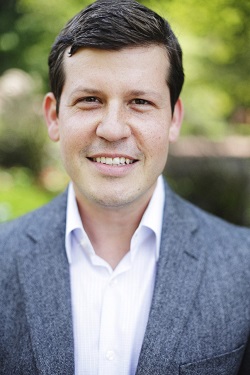February 18, 2020
Scholar Scott Herring presents on work on Friday, Feb. 21

On Friday, Feb. 21, scholar Scott Herring will present on his work at 4 p.m. in the Ekdahl Conference Room, third floor of Regnier Hall.
The talk, titled "The Trials of Robert Rayford," is part of the English department's 29th Annual Cultural Studies Symposium. It is free and open to the public.
Herring's lecture will survey the queer archives of Robert Rayford, a St. Louis teenager sensationalized as "the earliest known case of AIDS in this country." Through Rayford's story, Herring reveals a quagmire of scientific racism, metronormativity and debility that nevertheless offers us insight into representations of pre-Stonewall sexual cultures in the American Midwest.
Herring serves as the James H. Rudy professor in English and gender studies at Indiana University, Bloomington, where he teaches courses and conducts research on American literature and culture since 1914, gender and queer studies, and rural/regional studies. He received a Bachelor of Arts in English and in history from the University of Alabama, Birmingham and a Master of Arts and doctorate in English from the University of Illinois, Urbana-Champaign.
Herring is author of "Queering the Underworld: Slumming, Literature, and the Undoing of Lesbian and Gay History" (University of Chicago Press, 2007), "Another Country: Queer Anti-Urbanism" (New York University Press, 2010; Lambda Literary Award), and "The Hoarders: Material Deviance in Modern American Culture" (University of Chicago Press, 2014), as well as numerous scholarly essays and journal articles.
Lisa Tatonetti, professor of English and director of the Cultural Studies Program, praises Herring's contributions to the fields of American studies and queer studies.
"Scott Herring's work expands our discussions of space and place by highlighting the ways they are always intersecting with understandings of genders and sexualities. Herring further points to how the queer imaginary of 20th century print culture privileges a white, bicoastal, urban, male, and homonormative aesthetic. In the process, Herring demonstrates how these imagined parameters attempt to discipline our bodies, ideas, and realities," said Tatonettti.
For Jessica Preston Kerr, managing director of academic coaching for the Academic Achievement Center, Herring offers a model that moves beyond the classroom and scholarship alone to community practice.
"From the perspective of community organizing in Kansas, Herring's stories of rural queerness helped me interrogate my own practice of defining radicalism to see struggle differently and ultimately ask better questions — particularly about how we can complicate normative limits in order to build new forms of community and place," explained Kerr.
For more information about Herring's work, visit his website. For more information about the Cultural Studies Program in the Department of English, visit the Graduate Program's website.
Herring's talk is sponsored by the Department of English in the College of Arts and Sciences.
